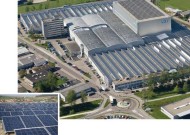 Environmental aspects have gained in importance in the business world as companies have discovered that ‘greening’ their business often has a positive impact on their economic results – in particular through reduced energy consumption, rebates for compliance with government regulations and subsidies for the use of alternative forms of energy.
Environmental aspects have gained in importance in the business world as companies have discovered that ‘greening’ their business often has a positive impact on their economic results – in particular through reduced energy consumption, rebates for compliance with government regulations and subsidies for the use of alternative forms of energy.
A company’s logistics processes offer sizable opportunities to reduce the impact of business on the environment. The energy consumption and the cost of a supply chain can basically be attributed to the areas of transport and warehousing.
Swisslog, a global supplier of integrated logistics solutions, suggest that the relevant factors for optimizing a company‘s overall environmental impact and logistics cost are closely interlinked and include:
• Green network design which optimizes transports in regard to CO2 emissions and the related cost. The analysis of a typical supply chain revealed that optimizing the network for cost could bring about 7% in cost savings coupled with a 25% reduction of CO2 emissions.
• Green civil engineering which offers a wide range of possible initiatives in the fields of energy efficiency (e.g. insulation, climatization and lighting), use of alternative forms of energy (e.g. blockheating- power plants, solar panels and energy piles) and other green initiatives in the wider sense (e.g. brownfield construction or wooden racking).
• Green mechatronics and automation which crucially depend on an appropriate dimensioning; optimum cost and impact on the environment are achieved by avoiding over-dimensioning. Using energy recuperation for the installed systems allows further ‘greening‘ of mechatronics and automation.
• Green in-house material flow processes which impact the costs and emissions of warehousing as well as distribution. Due to computer-aided load building, Swisslog helped an FMCG multinational to cut CO2 emissions and transport costs by 20% in one of their UK distribution centres.
Swisslog believe that the transition to ‘greener’ and more sustainable warehousing processes will be accelerated in future due to a growing awareness of environmental issues coupled with expected energy price increases in the medium to long term.
By deeply understanding customer requirements, Swisslog can help supply chains to take the required steps in their drive to green their logistics. Recent Swisslog implementations have shown that good pay back of these projects can be found.
For more information, or to obtain a copy of Swisslog’s white paper on Green Logistics, please contact Brian Grady on 07823 327 568 or brian.grady@swisslog.com.





Comments are closed.